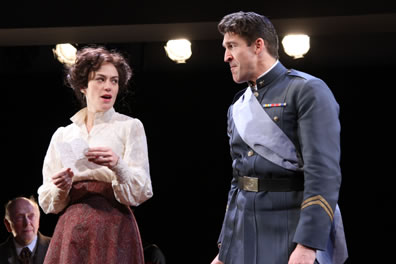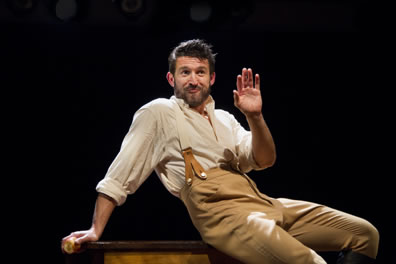Much Ado About Nothing
The Devilry Is in the Details of This Ado
Theatre for a New Audience, The Duke on 42nd Street, New York, N.Y.
Saturday, February 16, 2013 (Seats F–102&103, left front)
Directed by Arin Arbus
Don Pedro is an exuberant man of jokes and hoaxes. He likes to josh with Signor Benedick as much as the next person—especially when that next person is Beatrice. So, when she remarks with self-deprecating humor that she will never get a husband, Don Pedro suddenly feels pangs of love for this woman. Already displaying traits of a Type-A personality, he proposes to Beatrice. "Will you have me, lady?"

Beatrice (Maggie Siff) reads the love note written by Benedick (Jonathan Cake) in the Theatre for a New Audience's production of Much Ado About Nothing. Siff and Cake nail every joke and bring lively, fresh readings to their parts. Photo by Gerry Goodstein, Theatre for a New Audience.
It's a moment of suspended action in the Theatre for a New Audience's lively production of Much Ado About Nothing. Graham Winton's Don Pedro earnestly hopeful down on one knee; Robert Langdon Lloyd's Leonato standing in shock, his smile frozen between the unexpected promise of prosperity just offered by Don Pedro and the expected embarrassment surely to come from his niece; that niece, Maggie Siff's Beatrice, suddenly stuck between her humor and serious suitor. She breaks the ice as only she can: She cracks a joke. "No, my lord, unless I might have another for working days: your grace is too costly to wear every day." Leonato tenses more, though he's not sure if his niece has just insulted or complimented his prestigious guest. Don Pedro looks perplexed; was that a yes? a no? a call me maybe?
Such carefully crafted moments helmed by director Arin Arbus embroider a production that could have skated to success simply on the superbly performed interactions of Siff's Beatrice and Jonathan Cake's Benedick. Arbus, who also directed the company's Western-set, focal-point-searchingTaming of the Shrew last year with Siff as Kate, works with more confidence in the text with Much Ado, but it shows by generating more, and fuller, laughs. Though she sets the play in Sicily around 1910, the costumes by Constance Hoffman and Spiff Wiegand's accordion playing provide the only real clue of a specific time and place. The stage is bare except for a tree adjacent to the back corner and a large swing hanging over center stage. Arbus lets Shakespeare's language and vividly drawn personalities fill this space.
Much Ado can be broad comedy. It can be dark comedy. Arbus, thankfully, has made it a sitcom of personalities. Like the most popular television shows, the details of the minor characters surrounding the two chemically bonded stars make this Much Ado a resoundingly satisfying laugher without foregoing the serious aspects of the Claudio-Hero plot.
Siff and Cake as Beatrice and Benedick nail every single joke, whether in soliloquy, in tandem, or in concert with other characters. Their scenes together run the gauntlet of courtship with pitch-perfect emotion. At the start, they engage in mercilessly vicious banter, enjoying the battle at hand though the war seems to have already worn on them some. Their courtship after the church scene is genuinely sweet, both frightened by their feelings but determined to let them flow nonetheless. At the end they realize they have wandered far from their emotional comfort zones, but when their true love is publicly exposed, they literally rush into full-on romance, and it is so good.
Cake plays Benedick with a natural unease, a character more kin to Hugh Grant's character in Four Weddings and a Funeral than any other Benedick I've seen. The fusion of charm and arrogance with a dash of insecurity makes Cakes a rascal of a Benedick whom Beatrice could simultaneously find appealing and appalling. Siff's Beatrice is whip smart, proud, and pejorative, her quick-witted cutting remarks making her both attractive and aggravating to the likes of a Benedick. Siff shows sublime skills in her line readings, the way she flexes her voice to each line's purpose, like a Santana guitar line giving thrilling resonance to the verse.
The play's comic highlight comes after Don Pedro, Claudio (Matthew Amendt), and Leonato gull Benedick into believing Beatrice loves him and they send her in to fetch him to dinner. Director Arbus mines the fact that Shakespeare has established a multilevel joke of contrary understanding in this scene: Benedick is in one frame of mind, Beatrice in a completely opposite frame of mind, both believe the other shares their own frame of mind, and we, the audience, know both frames of mind. Cake lays on Benedick's come-hither charm, Siff presses Beatrice's scorn; Cake's Benedick struggles to interpret Beatrice's behavior to what he thinks he knows, Siff's Beatrice is baffled by Benedick's sudden change of tactics in their war of wits. The two actors combine perfect comic timing, well-honed expressions, and gesturing appeals to the audience for assistance in understanding, maximizing the intelligent slapstick comedy of this scene.
Watch Siff closely in the opening scene when the messenger arrives with news from the war. She holds a stiff bearing of barely-masked worry until she hears that "none of name" has been lost. Only then does she relax and start taunting Benedick in absentia. Cake, meanwhile, takes seriously Don Pedro's crack that in quarrels, Benedick "avoids them with great discretion, or undertakes them with a Christian-like fear"; Cake plays Benedick as apprehensive of physical combat. His response to Beatrice's request that he kill Claudio is automatic: "Not for the wide world" (that is, after he gets over his surprise, as Cake reads Benedick's "Ha" as a mouth-gaping synonym of "did I hear you right?"). When Beatrice responds in fury, Benedick first tries to calm the Beatrice he's come to love and get back into her good graces with his self-assumed charm; but realizing her earnestness, and that he is truly on the outs with her, he agrees to undertake the challenge. If there were any doubt of the extent of Benedick's love at this moment, understanding what fear he feels knowing he's going to duel with the accomplished, hot-headed Claudio should be convincing. Beatrice herself is in some awe—and we see at this moment the same Beatrice we saw when the messenger showed up at the play's start, worried for this one of name.
The rest of the company, likewise, brings deeply revealing emotions to the surface in key moments of their portrayals. Michelle Beck as Hero seems naïve and happy-go-lucky, but similar to Don Pedro making cutting jibes at Benedick during his gulling, Hero takes the opportunity in her gulling of Beatrice to berate some of her cousin's crueler personality traits. Is she joking, or does this Hero have a Machiavellian side to her? In the church scene, she's shocked and hurt to the point of destruction, but after she's put up with her father's berating long enough she lashes back at him. "O my father, prove you that any man with me conversed at hours unmeet." When Claudio is reading her obsequies at Hero's tomb, Beck, dressed in black, watches him from above. But she's only somewhat satisfied. When she reveals herself in the second wedding, she levels Claudio with a steely glare as she says, "Surely as I live, I am a maid."
Claudio is on notice, and that might work with Amendt's Claudio. He's likeable enough when he likes; but he's overly prickly, and when he believes he's abused even on the slimmest evidence he pouts, broods, and lashes out before endeavoring to get the whole truth and nothing but; perceived slight is the all with him. And so, his postchallenge interchanges with Benedick are spoken with an angry, even dangerous edge, all the way through to the end. Amendt's Claudio reveals Benedick's letter with the serious intent of publicly embarrassing him, and he speaks his final line—"I had well hoped thou wouldst have denied Beatrice, that I might have cudgeled thee out of thy single life to make thee a double-dealer, which out of question thou wilt be, if my cousin do not look exceeding narrowly to thee"—not in jest but as a perpetual warning. Benedick, though, endeavors to use great discretion to avoid this quarrel with his "Come, come, we are friends." Yet, earlier, upon hearing the truth of Don John's trick upon him, Claudio sinks to the ground in horror; his grief at what he's done to Hero is intense, and his appeal to Leonato to punish him with death is sincere. The moment is weighty enough to provide the monument scene with appropriate gravity, even though we are in on the new trick being played on him. Like Hero, we need to see Claudio's true repentance before we feel comfortable embracing him again.

Benedick (Jonathan Cake) explains in his sololiquy why he will forever be a bachelor in the Theatre for a New Audience's production of Much Ado About Nothing. This is a rascally Benedick, whose cockiness barely masks a persistent insecurity. Photo by Henry Grossman, Theatre for a New Audience.
Dogberry, meanwhile, is not and never is an ass. John Christopher Jones plays him as an endearing, slightly daffy old man we can't help respecting despite his malapropisms. Jones gives his instructions to the watch with such confidence and clarity that his reasoning sounds perfectly logical in the vein of Lewis Carroll. He's only an ass to the arrested Borachio (Paul Niebanck) and Conrade. Denis Butkus has played Conrade as a superiorly intelligent being, even around Don John (Saxon Palmer reveling in his own evilness), so he naturally explodes out of frustration with Dogberry and calls him an ass. Jones, however, doesn't set off on the traditional set piece of comic indignation that results in him establishing himself forever for the record as an ass. Halfway through the speech he proves his opening lines to have been intentional irony. Pointing out that he is an officer, a householder, and "as pretty a piece of flesh as any in Messina," Dogberry's seeming misplaced ego suddenly turns to validity, and he leans in closer to Conrade as he continues to describes himself as "one that knows the law, go to, and a rich fellow enough, go to, and a fellow that hath had losses"—and here Jones pauses, staring up right into Conrade's face. On the turn of this line, Conrade has become the ass, and he knows it. Dogberry closes out this scene with one final "O, that I had been writ down an ass!" but the connotation is that Conrade should also be charged for abusing the well-loved constable. It's still a laugh line, but one with great poignancy rather than simple foolishness.
Dogberry staring up at a Conrade with realization suddenly dawning on the latter is another suspended moment in this play. With such moments, intelligent humor trumps the slapstick, even in the ongoing presence of the slapstick. Arbus' Much Ado About Nothing is funny as clowns, funny as wit, and, most especially, funny as familiar personalities with foibles. If this production were a pilot for a TV sitcom, it would promise a top-rated show for many years.
Eric Minton
February 20, 2013
Comment: e-mail [email protected].
Start a discussion in the Bardroom



 Find additional Shakespeareances
Find additional Shakespeareances